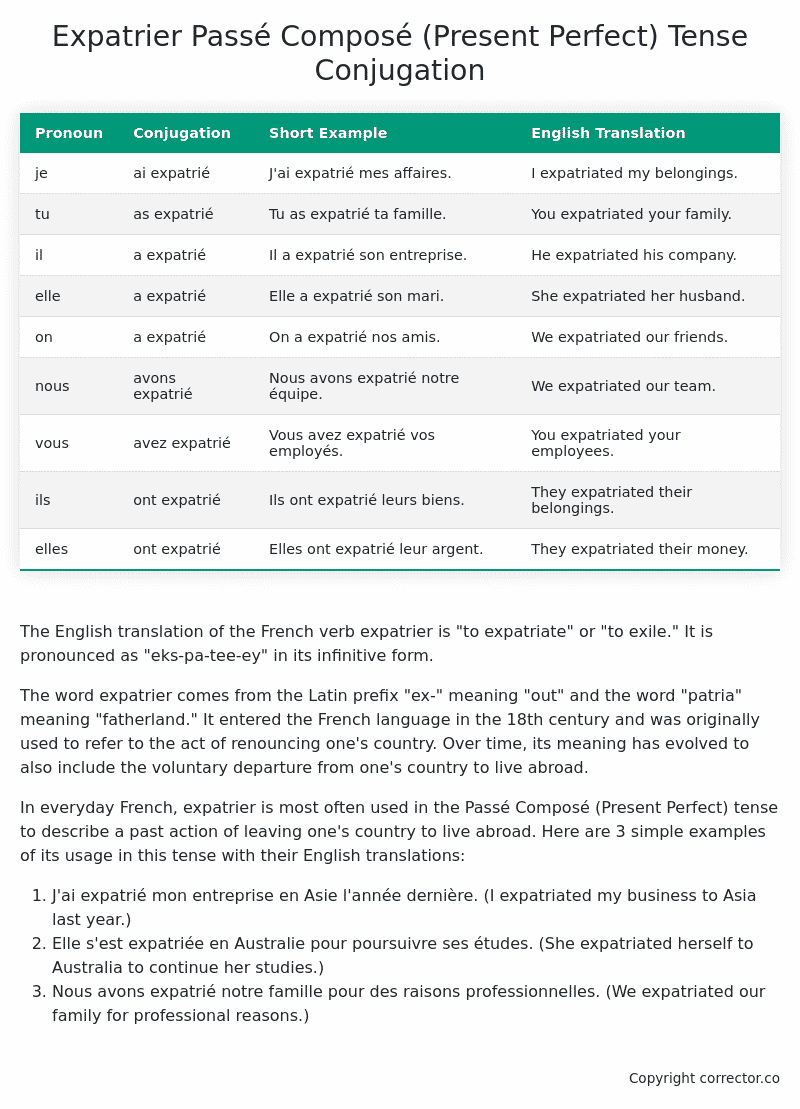Passé Composé (Present Perfect) Tense Conjugation of the French Verb expatrier
Introduction to the verb expatrier
The English translation of the French verb expatrier is “to expatriate” or “to exile.” It is pronounced as “eks-pa-tee-ey” in its infinitive form.
The word expatrier comes from the Latin prefix “ex-” meaning “out” and the word “patria” meaning “fatherland.” It entered the French language in the 18th century and was originally used to refer to the act of renouncing one’s country. Over time, its meaning has evolved to also include the voluntary departure from one’s country to live abroad.
In everyday French, expatrier is most often used in the Passé Composé (Present Perfect) tense to describe a past action of leaving one’s country to live abroad. Here are 3 simple examples of its usage in this tense with their English translations:
- J’ai expatrié mon entreprise en Asie l’année dernière. (I expatriated my business to Asia last year.)
- Elle s’est expatriée en Australie pour poursuivre ses études. (She expatriated herself to Australia to continue her studies.)
- Nous avons expatrié notre famille pour des raisons professionnelles. (We expatriated our family for professional reasons.)
Table of the Passé Composé (Present Perfect) Tense Conjugation of expatrier
| Pronoun | Conjugation | Short Example | English Translation |
|---|---|---|---|
| je | ai expatrié | J’ai expatrié mes affaires. | I expatriated my belongings. |
| tu | as expatrié | Tu as expatrié ta famille. | You expatriated your family. |
| il | a expatrié | Il a expatrié son entreprise. | He expatriated his company. |
| elle | a expatrié | Elle a expatrié son mari. | She expatriated her husband. |
| on | a expatrié | On a expatrié nos amis. | We expatriated our friends. |
| nous | avons expatrié | Nous avons expatrié notre équipe. | We expatriated our team. |
| vous | avez expatrié | Vous avez expatrié vos employés. | You expatriated your employees. |
| ils | ont expatrié | Ils ont expatrié leurs biens. | They expatriated their belongings. |
| elles | ont expatrié | Elles ont expatrié leur argent. | They expatriated their money. |
Other Conjugations for Expatrier.
Le Present (Present Tense) Conjugation of the French Verb expatrier
Imparfait (Imperfect) Tense Conjugation of the French Verb expatrier
Passé Simple (Simple Past) Tense Conjugation of the French Verb expatrier
Passé Composé (Present Perfect) Tense Conjugation of the French Verb expatrier (this article)
Futur Simple (Simple Future) Tense Conjugation of the French Verb expatrier
Futur Proche (Near Future) Tense Conjugation of the French Verb expatrier
Plus-que-parfait (Pluperfect) Tense Conjugation of the French Verb expatrier
Passé Antérieur (Past Anterior) Tense Conjugation of the French Verb expatrier
Futur Antérieur (Future Anterior) Tense Conjugation of the French Verb expatrier
Subjonctif Présent (Subjunctive Present) Tense Conjugation of the French Verb expatrier
Subjonctif Passé (Subjunctive Past) Tense Conjugation of the French Verb expatrier
Subjonctif Imparfait (Subjunctive Imperfect) Tense Conjugation of the French Verb expatrier
Subjonctif Plus-que-parfait (Subjunctive Pluperfect) Tense Conjugation of the French Verb expatrier
Conditionnel Présent (Conditional Present) Tense Conjugation of the French Verb expatrier
Conditionnel Passé (Conditional Past) Tense Conjugation of the French Verb expatrier
L’impératif Présent (Imperative Present) Tense Conjugation of the French Verb expatrier
L’infinitif Présent (Infinitive Present) Tense Conjugation of the French Verb expatrier
Struggling with French verbs or the language in general? Why not use our free French Grammar Checker – no registration required!
Get a FREE Download Study Sheet of this Conjugation 🔥
Simply right click the image below, click “save image” and get your free reference for the expatrier present perfect tense conjugation!

Expatrier – About the French Passé Composé (Present Perfect) Tense
Formation of the Passé Composé
Set the auxiliary verb with either
Conjugate the auxiliary verb
Add the past participle
Common everyday usage patterns
Narrating Past Events
Sequential Actions
Describing Completed Actions
Interactions with other tenses
Imperfect Tense
Conditional and Future Tenses
Summary
I hope you enjoyed this article on the verb expatrier. Still in a learning mood? Check out another TOTALLY random French verb conjugation!


